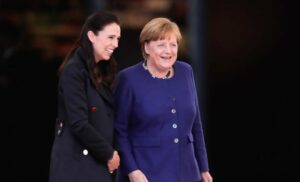It’s Not Democracy Without Women in Positions of Power
Originally published by Minna Cowper-Coles for World Politics Review
There was a moment in 2020 when women’s political leadership was in the spotlight. From German Chancellor Angela Merkel and Iceland’s Prime Minister Katrin Jakobsdottir to Taiwanese President Tsai Ing-wen and New Zealand’s Prime Minister Jacinda Ardern, women leaders were seen to be winning the war against COVID-19, with their countries suffering fewer deaths than their neighbors.
Speculation arose as to whether and why women make better leaders, particularly in the context of crisis. Was it that these nations already prioritized care before they were led by women, or because they were wealthy democracies in which women were more able to become leaders? Was it purely coincidence that Taiwan, New Zealand and Iceland are all island nations, giving them a natural advantage in controlling the spread of the coronavirus? Or was there something about women’s abilities or style of leadership that set them apart in the pandemic?
The issue was never resolved, and as the economic and social impacts of lockdowns and the complexities of vaccination programs came to the fore, the pandemic-era conversation moved on.
As a result, the question of whether women make better leaders in a crisis remains unanswered. Now, though the world continues to face numerous crises and potential crises, from wars and economic turbulence to the chaos of climate change and unregulated AI, the near-absence of women from the world stage has returned to being something of a “So what?” issue. Does the gender of those governing and creating policy really matter, so long as they are reasonable people with good intentions? Surely, this argument goes, we need to change the world, not nitpick about who should be doing the changing. By this framing, the desire to see more women at the top, whether in corporations or governments, often seems like an elitist issue, something that would be “nice to have,” but that isn’t necessarily urgent.
To the contrary, however, women’s political leadership is more, not less, important in the current circumstances.
